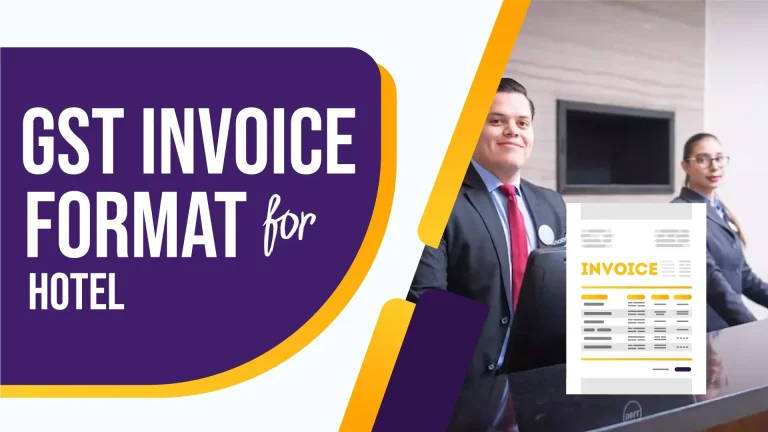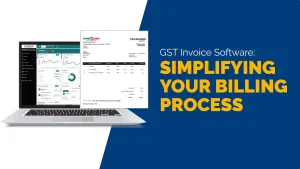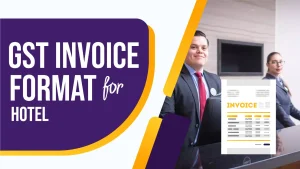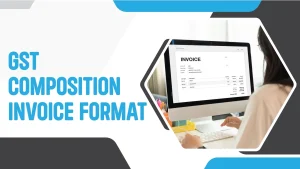In the hospitality industry, especially for hotels, managing financial transactions is a very important task. One key part of this financial management is creating invoices that follow the rules of the Goods and Services Tax (GST) in India. Having a well-structured GST invoice format for hotels helps not only to meet tax laws but also to keep the business running smoothly and make sure customers are happy. In this blog, we will discuss in detail the GST invoice format for hotels, why it is essential, what components it should have, and the best practices to follow.
Understanding GST in the Hospitality Industry
The Goods and Services Tax (GST) is a comprehensive tax that applies to the manufacture, sale, and consumption of goods and services across India. For hotels, GST has made things simpler by replacing various old taxes, like service tax and luxury tax, with one single tax. Hotels need to charge GST on the services they offer, which can include room rentals, food and beverages, and other extra services.
GST Rates Applicable to Hotels
The GST rates for hotels depend on the room price per night. Here are the different GST rates that apply:
- Room Tariff Below ₹1,000: No GST charged.
- Room Tariff Between ₹1,001 and ₹7,500: 12% GST is applicable.
- Room Tariff Above ₹7,500: 18% GST is applicable.
These rates are very important for hotels to know when creating invoices to ensure they charge the correct amount of tax.
Importance of a Proper GST Invoice Format
A proper GST invoice format for hotels serves several purposes. It not only helps in following the law but also aids in making financial transactions clear and efficient. Here are some key reasons why a correct GST invoice format is crucial:
Legal Compliance
A GST invoice must meet the rules and requirements set by the GST Act. If hotels do not comply, they may face penalties and legal problems, which can harm their reputation and financial health.
Accurate Tax Calculation
A structured invoice format ensures that the GST amount is calculated accurately, which is essential for both the hotel and its customers. Correct tax calculations help in avoiding any discrepancies and make financial audits easier.
Enhanced Customer Experience
A clear and detailed invoice improves the customer experience by providing a transparent breakdown of charges. This transparency builds trust between the hotel and its guests and can lead to repeat business in the future.
Streamlined Accounting
Having a standardized invoice format helps to streamline the accounting process. This makes it easier to track financial transactions, file tax returns, and manage financial records effectively.
GST Invoice Format for Hotel
|
|||
|
|||
| Payment Method | Check # | ||
| Check | 1000 | ||
| Item | Price | ||
| Room (Deluxe Room) – 2 nights | ₹7,000 | ||
| Food and Beverages | ₹1,500 | ||
| Spa Services | ₹2,000 | ||
| Service Charge | ₹500 | ||
| Subtotal: ₹11,000 | |||
| CGST (9%): ₹990 | |||
| SGST (9%): ₹990 | |||
| Total: ₹12,980 | |||
Terms and Conditions
Payment is due within 10 days. Please include the invoice number on your check.
Thank you for your business!
Components of a GST Invoice for Hotels
A GST invoice for hotels should include specific details to ensure it meets the regulatory requirements. Below are the essential components that should be included in a GST invoice:
1. Invoice Header
- Hotel Name and Logo: The name and logo of the hotel should be clearly displayed at the top of the invoice.
- Invoice Title: The title should clearly state “Tax Invoice” so that it is easily recognizable.
2. Hotel Details
- Address: The complete address of the hotel should be mentioned.
- GSTIN: This is the Goods and Services Tax Identification Number of the hotel.
- Contact Information: Include the contact number and email address of the hotel for customer inquiries.
3. Customer Details
- Name: The name of the customer who stayed at the hotel.
- Address: The address of the customer.
- GSTIN (if applicable): If the customer is registered under GST, include their GSTIN.
4. Invoice Details
- Invoice Number: This is a unique serial number for each invoice issued.
- Invoice Date: The date on which the invoice is created and issued.
- Booking Reference Number: Include a reference number for the booking made by the customer.
5. Room Details
- Room Type: Specify the type of room booked by the guest (for example, deluxe room, suite, etc.).
- Room Tariff: The price of the room per night.
- Number of Nights: The total number of nights the guest stayed at the hotel.
- Total Room Charges: This is calculated by multiplying the Room Tariff by the Number of Nights stayed.
6. Additional Charges
- Food and Beverage: List any charges for food and beverages consumed during the stay.
- Other Services: Include charges for other services provided, such as spa treatments, laundry services, etc.
- Service Charge: If applicable, add any service charge to the invoice.
7. Tax Details
- CGST and SGST: The Central Goods and Services Tax and the State Goods and Services Tax that are applicable based on the transaction.
- IGST: The Integrated Goods and Services Tax, which is applicable for transactions between states.
- Total Tax Amount: The total amount of tax charged on the invoice.
8. Total Amount
- Total Invoice Amount: The total amount payable by the customer, which includes all charges and applicable taxes.
9. Terms and Conditions
- Payment Terms: Provide information regarding the payment terms (for example, payment upon check-in, check-out, etc.).
- Cancellation Policy: Clearly state the hotel’s cancellation policy.
- Other Terms: Mention any other relevant terms and conditions that may apply.
10. Signature
- Authorized Signatory: Include the signature of the authorized person from the hotel who is responsible for issuing the invoice.
Creating a GST Invoice: A Step-by-Step Guide
Creating a GST invoice for a hotel involves several steps. Here is a step-by-step guide to help you create a comprehensive and compliant GST invoice:
Step 1: Gather Information
Collect all necessary information about the customer, the booking details, and the services that were provided during their stay. Make sure to have accurate details to avoid mistakes.
Step 2: Calculate Charges
Calculate the charges for the room, any additional services, and any other applicable fees. Ensure that you are using the correct GST rate based on the room tariff.
Step 3: Prepare the Invoice
Using a standardized template, prepare the invoice by filling in all the required details. Ensure that all components of a GST invoice are included, as mentioned above.
Step 4: Verify Details
Double-check all the details on the invoice for accuracy. Verify the GST calculations and make sure that all charges are correctly listed and calculated.
Step 5: Issue the Invoice
Once everything is verified, issue the invoice to the customer. Provide them with a copy of the invoice and keep a copy for your own records.
Best Practices for GST Invoices in Hotels
Adhering to best practices when creating GST invoices can help hotels maintain compliance and ensure smooth operations. Here are some best practices to consider:
Use Standardized Templates
Using standardized templates for GST invoices ensures consistency and accuracy. This approach also makes it easier to train staff and streamline the invoicing process, reducing the chances of errors.
Automate Invoicing
Consider using hotel management software that includes invoicing features. Automation can reduce the likelihood of errors and save time for staff, allowing them to focus on providing excellent service to guests.
Regular Audits
Conduct regular audits of your invoicing process to ensure compliance with GST regulations and to identify any discrepancies. Regular audits help maintain accurate financial records and can alert you to any potential issues before they become significant problems.
Keep Updated with GST Regulations
Stay updated with any changes in GST regulations that may affect your invoicing process. Being informed about these changes helps ensure compliance and avoid any penalties that may arise from non-compliance.
Provide Training
Provide regular training to your staff on GST invoicing procedures. Well-trained staff can help ensure that invoices are accurate and compliant, contributing to overall operational efficiency.
Conclusion
The GST invoice format for hotels plays a crucial role in maintaining legal compliance, accurate tax calculation, and enhancing customer satisfaction. By understanding the components of a GST invoice, following best practices, and staying updated with regulations, hotels can streamline their invoicing process and ensure smooth financial operations.
Creating a comprehensive and compliant GST invoice not only helps avoid legal issues but also builds trust with customers through transparent and accurate billing. Adopting standardized templates, automating the invoicing process, and providing regular training to staff are key steps in achieving this goal.
Also Read
- How to Ensure Data Security in Your Invoice Management SystemIn today’s digital age, businesses rely heavily on technology to streamline operations and improve efficiency. An invoice management system plays a crucial role in managing financial transactions and maintaining accurate records. However, with the increasing reliance on technology comes the… Read more: How to Ensure Data Security in Your Invoice Management System
- GST Invoice Software: Making Billing EasyIn today’s busy world of business, being efficient is super important. One big thing that needs to be super efficient is billing. With new technology, old-fashioned manual billing is out of date and can make a lot of mistakes. That’s… Read more: GST Invoice Software: Making Billing Easy
- GST Invoice Format for HotelIn the hospitality industry, especially for hotels, managing financial transactions is a very important task. One key part of this financial management is creating invoices that follow the rules of the Goods and Services Tax (GST) in India. Having a… Read more: GST Invoice Format for Hotel
- GST Composition Invoice FormatThe GST (Goods and Services Tax) Composition Scheme is a straightforward and user-friendly taxation scheme designed for small businesses in India. This scheme reduces the compliance burden for small taxpayers by allowing them to pay GST at a fixed rate… Read more: GST Composition Invoice Format
- Everything You Should Know About Car Bill InvoiceWhen it comes to car purchases, sales, repairs, or rentals, a car bill invoice is an essential document. This invoice serves as a record of the transaction and provides a detailed account of the services rendered or goods sold. Understanding… Read more: Everything You Should Know About Car Bill Invoice
Frequently Asked Questions
What is the importance of a GST invoice for hotels?
A GST invoice is essential for hotels as it ensures legal compliance with GST laws, accurate tax calculation, and transparency in billing. It helps in maintaining detailed financial records, making the tax filing process easier, and avoiding legal penalties. A well-structured GST invoice also enhances customer trust and satisfaction by clearly itemizing all charges and taxes applied during their stay, promoting transparency and reducing disputes.
What details must be included in a GST invoice for hotels?
A GST invoice for hotels should include the hotel’s name, address, GSTIN, invoice number, date, and customer details. It must also list room charges, additional services, food and beverage charges, applicable GST rates, CGST, SGST, or IGST amounts, and the total payable amount. Including terms and conditions, payment details, and authorized signature ensures completeness and compliance with GST regulations.
How does GST apply to different room tariffs in hotels?
GST rates for hotels vary based on room tariffs. No GST is charged for rooms with tariffs below ₹1,000 per night. For tariffs between ₹1,001 and ₹7,500, a 12% GST applies. Rooms with tariffs above ₹7,500 are charged 18% GST. These rates help in accurate tax calculation and ensure compliance with GST regulations.
Can a hotel customer claim input tax credit (ITC) on GST?
Yes, a hotel customer can claim an input tax credit (ITC) on GST if they are registered under GST and the invoice includes their GSTIN. The invoice must be compliant with GST regulations and the services must be used for business purposes. ITC allows businesses to reduce their tax liability by claiming credit for the GST paid on purchases and services.
How should a hotel handle GST for food and beverage services?
GST for food and beverage services in hotels is typically charged at 5% without ITC for standalone restaurants. However, if the food and beverages are part of a bundled service with room accommodation, the rate applicable to the room tariff may apply. It’s important to itemize these charges separately on the invoice for clarity and compliance.
What is the procedure for issuing a GST invoice in a hotel?
To issue a GST invoice, gather customer and booking details, calculate room and service charges, apply the correct GST rates, and fill in all required information on a standardized template. Verify the details for accuracy, ensure the invoice meets GST regulations, and issue it to the customer. Keep a copy for records and audit purposes.
What happens if a hotel does not comply with GST invoicing rules?
Non-compliance with GST invoicing rules can lead to legal penalties, fines, and audits from tax authorities. It may also result in inaccurate tax calculations, potential financial discrepancies, and damage to the hotel’s reputation. Ensuring compliance is crucial for smooth operations and maintaining customer trust.
Are there any exemptions from GST for hotel services?
Yes, rooms with tariffs below ₹1,000 per night are exempt from GST. Additionally, certain promotional offers and packages might have specific GST implications. It is essential to stay updated with GST regulations to understand any exemptions and ensure accurate billing.
How can hotels automate their GST invoicing process?
Hotels can automate their GST invoicing process using hotel management software that includes invoicing features. These systems automatically calculate GST, generate compliant invoices, and help maintain accurate financial records. Automation reduces errors, saves time, and ensures consistency in the invoicing process.
What are the best practices for maintaining GST compliance in hotels?
Best practices include using standardized invoice templates, automating the invoicing process, conducting regular audits, staying updated with GST regulations, and providing staff training. These practices help ensure accurate GST calculations, compliance with laws, and efficient financial management, contributing to the hotel’s overall success.







